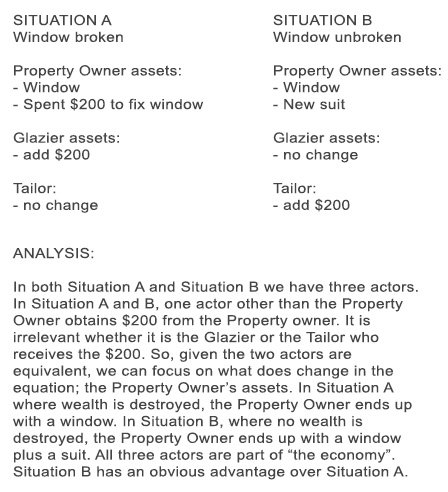Is Destruction Good for the Economy?
A window was broken. Is this a net negative or positive for the economy? Look to your intuition. Does this sound to you like a net negative or positive?
Some (Keynes, Krugman, Bernanke) say: The net effect on the economy is positive. Why/How? "Because the window owner must pay a glazier to fix the window. Obviously, this stimulates the economy." So when you hear it that way, it starts to sound like oh maybe this is a good thing!

Some (Hayek, Schiff, Woods, Rothbard, Mises) disagree. Here is my attempt at simplifying their explanation:
Situation 1: The window is broken.
Situation 2: The window is not broken.
In Situation A: The window owner pays $200. He has a window (like he had before). The glazier gains. Maybe the glazier's employees gain, Etc.
In Situation B: The window owner pays $200. He has a window (that never broke) and the $200 instead went toward a new suit. Instead of the glazier gaining, the suit maker gains. Maybe his employees gain. Etc. In this situation, the suit maker gaining is equivalent to the glazier gaining in Situation A. So what is different? The owner of the window has a window still AND has a new suit.
For those who have a hard time seeing the logic, here is a picture:

The only argument I can see for this that makes some sense is that the owner of the window in Situation A might be replacing his window with one that is newer/better. But this begs the questions: (1) How much better, if at all? (2) Isn't it overall typically advantageous for a person to choose themselves when/if they wish to replace or fix an old thing? Would you personally rather have someone make that choice for you by breaking your stuff? Or how about this: If you believe in this idea that destroying wealth is a good way to somehow stimulate greater wealth creation, and when you think about how to begin, do you get a warm fuzzy feeling about destroying your own prosperity and/or that of the surrounding community?

And: Is this a sustainable thing? In other words, your current economic situation might not be noticeably adversely affected by you choosing to throw away a few pair of shoes and go out and buy new ones to replace them. But what if you scale up? What if you do the same thing with your whole wardrobe, furniture, car, and even house? At what point do you start to realize you are losing far more than the value you are getting back? Yes, when you start talking about insured goods, it gets complicated and even illegal, ha! But the point I'm trying to make here is:
Your intuition is correct! Don't let the politicians and the "economists" who support them convince you otherwise! Destroying wealth is not an efficient or sustainable way to create new wealth!
"Those who think that the destruction of war increases total 'demand' forget that demand and supply are merely two sides of the same coin. They are the same thing looked at from different directions. Supply creates demand because at bottom it is demand. The supply of the thing they make is all that people have, in fact, to offer in exchange for the things they want. In this sense the farmers' supply of wheat constitutes their demand for automobiles and other goods. All this is inherent in the modern division of labor and in an exchange economy." ~Economics in One Lesson by Henry Hazlitt
Updated from an article I wrote at https://www.clearsay.net
Good article. You should really use the same profile picture as you do on FaceBook, much better! :) - Michael Bach
I think this is a nonissue, the only issue that maters, the only matter of fact is that the world is run on IOU notes, people are paid in IOU notes, and the ones that enforce and control this debt based system are the economy, what they say and what they do is law.
The only thing that maters is trust, and if you place your trust in the hands of people who have portrayed themselves to be public officials when they only swore an oath to the Constitution of the United States you're pretty much agreeing to peonage, slavery, indebted servitude, and these officers are impersonating the officials who would swear an oath to the Constitution for the united States to ever act in such form, and that doesn't come with immunity but full personal responsibility and accountability for each one who swears an oath to the CftuS under the different services it contracted with The People to deliver in good faith, without any The People ever requesting for this or demanding it, but completely in good faith.
If we are to have money everyone needs to come to an agreement of what money is. For all it stands, in our history each time money was symbolized it became essentially impossible for it to be money anymore, the moment money became something other than the abstraction it is, it ceased being money and became a store of value.
Money is a division of value into units that are agreed upon, the shorter definition is money is a system of measuring value. As such, as is a pound, a mile or a gallon, it cannot be anything but an abstraction, which itself cannot have any value, it's just a reference, a point of agreement of how many units of value something is worth, in order to facilitate exchange/trade. Money are units wrote in a ledger for an account, exactly like in the past as it was recorded on tally sticks with corresponding marks, creating two identical and unique ledgers denoting value or "debt in credit out" (bounded input, bounded output, www.bibocurrency.com)or by tying ropes into knots, as the debt would be paid with a credit then the sticks would be discarded, or the ledger would mark the account closed.
Money as a store of value or commodity is a bastardization of what money used to be, thank the Crown for that. The last money we had might have been tally sticks, ever since then we have been bartering with one commodity after another, to the point that what initially became a note symbolizing a store of value's weight, which could be redeemed for that value in order to discharge the debt which the note was a testament for, has became itself a store of value impersonating money.
The symbolic symbolized "monopoly" of "measuring" value otherwise known as an ounce of silver dollar, which was the bastardized successor to real money or money as a unit of measure which is created freely and agreed upon by both parties, and it was catastrophic when there was no "silver" to pay people in, exactly why we went to war for independence, and hardly any other reason.
http://citizensamericaparty.org/happiness.htm